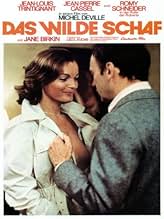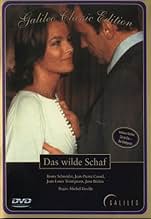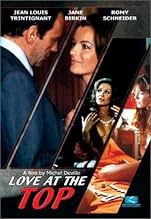IMDb RATING
6.8/10
2.1K
YOUR RATING
A cynical tragicomedy focusing on the different ways of love in the times of the sexual revolution.A cynical tragicomedy focusing on the different ways of love in the times of the sexual revolution.A cynical tragicomedy focusing on the different ways of love in the times of the sexual revolution.
- Director
- Writers
- All cast & crew
- Production, box office & more at IMDbPro
Storyline
Did you know
- TriviaJane Birkin said she asked Jean-Louis Trintignant to hit her for real in a scene. "My first scene was rather difficult: I was naked in front of Trintignant in the hotel room. Moreover, in the script, it was written that he was kissing my breasts. I thought: My God, he has fallen badly! I was ashamed. Only one thing helped me: he had to slap me and make me fall on the floor. Now, when you get a slap on the mouth, your mouth becomes like cotton when you say the next lines. I had to say, 'You have a little bike in your head'. My mouth hurt and I said it in a cottony way. Unfortunately, we had to double the scene because of the camera noise, and I couldn't do it as well. I would have had to get a grip on myself! Today, I wouldn't hesitate to do it. Trintignant was nice, he didn't want to hurt me. I wanted him to hurt me, I begged him to hit me," Birkin recalled.
- ConnectionsReferenced in Last Stop on the Night Train (1975)
Featured review
"Like the first touch of pleasure and guilt, like a spontaneous youthful flirt of fascination and fear, like a climax of contrary emotions" said one of the movie buffs after viewing LOVE AT THE TOP, the misinterpreted title version of stylish director Michel Deville's LE MOUTON ENRAGE.
Vincent Canby in New York Times, however, just after the 1974 premiere of the movie stated: "LOVE AT THE TOP which opened yesterday at the 68th Street Playhouse, is a 1973 French comedy that dimly recalls a number of nineteen-fifties English comedies about the rise and rise of cynical young men possessing—and possessed by—ambition." Yet, the significant difference that he mentioned was the fact that LOVE AT THE TOP is not concerned with the English class system...(January 27, 1975)
Having left the evaluations up to single individuals, of course, the test of time has done its just job. What may be said with certainty after more than 30 years is that we can hardly find such movies like LE MOUTON ENRAGE where decadence appears innocent, where liaisons appear youthfully enthusiastic, where feelings occur so manipulative.
For Romy Schneider's fans, it seems useless to point out that this film is a must see, not only because she gives a unique performance (as she did in all of her roles) at the heyday of her career (9 years before her sudden death) but because she is particularly attractive here. It is not TRIO INFERNAL where the, so to say, 'forced escape' from and the mockery of Romy's sweet image haunted for years by saccharine Sissi meets its most discouraging manifestation, but a film where the brilliant actress is given a fair role. She plays Roberte, a woman who becomes the object of lust for the story's lead, playboy Nicolas Mallet (Jean Louis Trintignant). It is him who takes financial profits from lustful liaisons. This movie can boast truly memorable and unique shots of Romy and she is given some of her very best scenes. Romy's sex appeal is unforgettable here.
Another strong point of the film is its execution of the content with a development of individual perception. Immoral as it may seem, the director makes a perfect use of contrast: conventions vs pleasures, innocence vs decadence, genuine lust vs instrumental affair. Nicola owns most of the features that viewers may like or detest, may find attractive or disgusting; yet, his are the features the viewers must treat seriously, more to say, they are the ones we all must accept. That is why, one is led to a peculiar, gently wild, erotically unique world of the main character. Although he sleeps with lots of women, there are two women that represent a sort of contrary worlds for Nicola: Roberte Groult (Romy Schneider) and Marie-Paul (Jane Birkin). He manipulates them, makes love to them, cannot refrain from both desire for their bodies and desire for money; yet, he perceives them differently. Yet, despite all of this 'adult maturity,' he is emotionally like a little boy who plays with a toy-car on the table - a sort of 'detailed insight into male mind...' in a comedy-like way, of course.
Finally, there are very good performances, which makes LE MOUTON ENRAGE slightly underrated. Not only the aforementioned Romy Schneider does a brilliant job supplying the viewers with an extraordinary insight into her role, but young Jane Birkin appears to be convincing in the role of young, inexperienced streetwalker Marie Paul, Jean Louis Trintignant makes it possible to see Nicola in the right way. This artistic merit lying in performances goes with terrific music by Camille Saint-Saëns, the tune that will ring in your ears for long. Therefore, apart from some flaws of the movie like dated colors, slow action (sometimes), possible clichés (noticed by some viewers), the merits should be found significant.
LE MOUTON ENRAGE, in sum, is a clear manifestation of contrary manipulative tools in life. It is worth seeing as a moment in Romy's career, a prelude to strong eroticism, a chain of contrary emotions, of love and hatred, appreciation and disgust compared to the first orgasm and the first angasm... But aren't we, humans, 'viewers,' movie buffs built upon such contrasts?
Vincent Canby in New York Times, however, just after the 1974 premiere of the movie stated: "LOVE AT THE TOP which opened yesterday at the 68th Street Playhouse, is a 1973 French comedy that dimly recalls a number of nineteen-fifties English comedies about the rise and rise of cynical young men possessing—and possessed by—ambition." Yet, the significant difference that he mentioned was the fact that LOVE AT THE TOP is not concerned with the English class system...(January 27, 1975)
Having left the evaluations up to single individuals, of course, the test of time has done its just job. What may be said with certainty after more than 30 years is that we can hardly find such movies like LE MOUTON ENRAGE where decadence appears innocent, where liaisons appear youthfully enthusiastic, where feelings occur so manipulative.
For Romy Schneider's fans, it seems useless to point out that this film is a must see, not only because she gives a unique performance (as she did in all of her roles) at the heyday of her career (9 years before her sudden death) but because she is particularly attractive here. It is not TRIO INFERNAL where the, so to say, 'forced escape' from and the mockery of Romy's sweet image haunted for years by saccharine Sissi meets its most discouraging manifestation, but a film where the brilliant actress is given a fair role. She plays Roberte, a woman who becomes the object of lust for the story's lead, playboy Nicolas Mallet (Jean Louis Trintignant). It is him who takes financial profits from lustful liaisons. This movie can boast truly memorable and unique shots of Romy and she is given some of her very best scenes. Romy's sex appeal is unforgettable here.
Another strong point of the film is its execution of the content with a development of individual perception. Immoral as it may seem, the director makes a perfect use of contrast: conventions vs pleasures, innocence vs decadence, genuine lust vs instrumental affair. Nicola owns most of the features that viewers may like or detest, may find attractive or disgusting; yet, his are the features the viewers must treat seriously, more to say, they are the ones we all must accept. That is why, one is led to a peculiar, gently wild, erotically unique world of the main character. Although he sleeps with lots of women, there are two women that represent a sort of contrary worlds for Nicola: Roberte Groult (Romy Schneider) and Marie-Paul (Jane Birkin). He manipulates them, makes love to them, cannot refrain from both desire for their bodies and desire for money; yet, he perceives them differently. Yet, despite all of this 'adult maturity,' he is emotionally like a little boy who plays with a toy-car on the table - a sort of 'detailed insight into male mind...' in a comedy-like way, of course.
Finally, there are very good performances, which makes LE MOUTON ENRAGE slightly underrated. Not only the aforementioned Romy Schneider does a brilliant job supplying the viewers with an extraordinary insight into her role, but young Jane Birkin appears to be convincing in the role of young, inexperienced streetwalker Marie Paul, Jean Louis Trintignant makes it possible to see Nicola in the right way. This artistic merit lying in performances goes with terrific music by Camille Saint-Saëns, the tune that will ring in your ears for long. Therefore, apart from some flaws of the movie like dated colors, slow action (sometimes), possible clichés (noticed by some viewers), the merits should be found significant.
LE MOUTON ENRAGE, in sum, is a clear manifestation of contrary manipulative tools in life. It is worth seeing as a moment in Romy's career, a prelude to strong eroticism, a chain of contrary emotions, of love and hatred, appreciation and disgust compared to the first orgasm and the first angasm... But aren't we, humans, 'viewers,' movie buffs built upon such contrasts?
- marcin_kukuczka
- Oct 17, 2009
- Permalink
- How long is Love at the Top?Powered by Alexa
Details
- Release date
- Countries of origin
- Language
- Also known as
- Das wilde Schaf
- Filming locations
- Jardin des Batignolles, Paris 17, Paris, France(park where Nicolas meets Marie-Paule)
- Production companies
- See more company credits at IMDbPro
- Runtime1 hour 45 minutes
- Sound mix
- Aspect ratio
- 1.66 : 1
Contribute to this page
Suggest an edit or add missing content
































